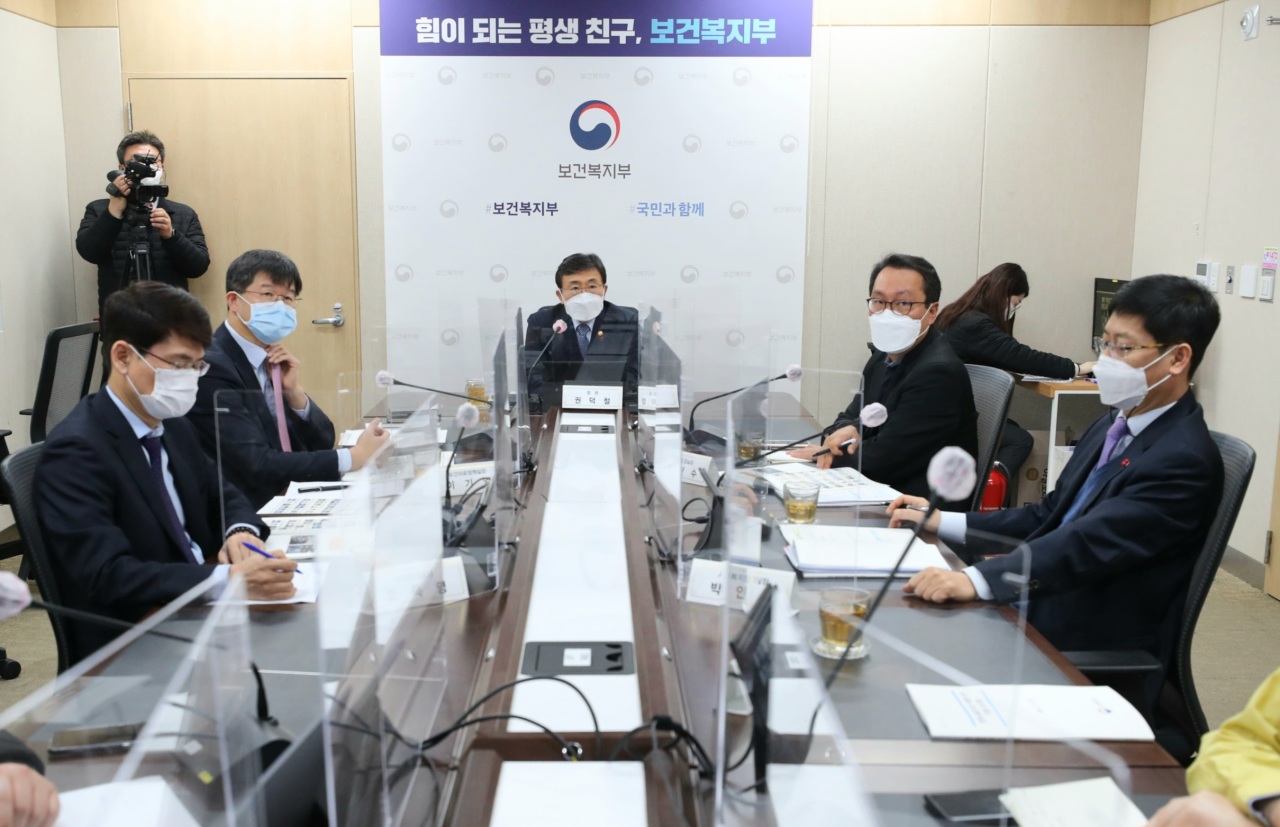 |
Health and Welfare Minister Kwon Deok-cheol (center) speaks during a virtual press conference Wednesday. (Ministry of Health and Welfare) |
Social distancing will likely be necessary for the rest of the year, Minister of Health and Welfare Kwon Deok-cheol said Thursday.
“Even if we achieve 70 percent herd immunity, social distancing and other public health measures will probably persist for a while,” he told a virtual press conference, suggesting that vaccinations alone would not immediately put an end to the outbreak.
The minister said the government aimed to vaccinate around 70 percent of the population against COVID-19 by November, so that the spread can be minimized before winter starts.
People will not get to choose which vaccine they will receive, he said, to “reduce public confusion.” In Tuesday’s announcement, the government said it has secured enough COVID-19 vaccines for a total of 76 million people from companies such as AstraZeneca, Moderna, Pfizer, Janssen and Novavax as well as the WHO-led COVAX initiative.
“Instead the government will closely monitor all the possible side effects that may arise over the vaccination process so that everything proceeds as safely as possible,” he said.
AstraZeneca’s is the only vaccine currently being reviewed by the Food and Drug Safety Ministry for authorization, with the results to be available sometime in February.
As for the order of priority in the vaccination program, the minister said the government planned to release the details by the end of this month. Those on the priority list will include older adults aged 65 or above, people with medical conditions and essential workers such as health care professionals, according to the previous government announcement.
In South Korea, vaccinations against COVID-19 will begin in February or early March, he said. An antibody drug is also set to be approved conditionally sometime next month. “2021 will be a year of COVID-19 vaccines and treatments,” he said.
The minister recognized that so far the social distancing campaign in Korea has been largely voluntary and that as a result businesses went uncompensated.
“Now that it’s been over a year, it’s time to consider how to support and compensate those who have not been able to operate their businesses to full capacity because they have been following the government regulations,” he said.
Before the country sees another surge in infections, the government will come up with ways to prevent the kinds of hospital bed shortages it has experienced over the past year, he said.
At one point in December, 595 patients in Seoul were waiting at home for hospital beds to open up after being diagnosed with COVID-19. Between December and mid-January, at least 11 patients in the capital area died waiting for treatment for more than a day.
Meanwhile, in a news briefing held the same day, the Korea Disease Control and Prevention Agency said it would investigate the reinfection potential of the newly discovered COVID-19 variants. Korea has identified 18 patients infected with the variants, all of them international arrivals from Brazil, South Africa or the UK.
“We will look into how the variants may affect the vaccines and treatments that are being developed here in Korea,” said KDCA senior official Lim Sook-young.
Korea reported 401 more new cases of COVID-19 on Thursday -- 380 locally transmitted and 21 imported. The cumulative tally of official cases stands at 73,918.
There are 11,756 patients with active infections, of whom 317 are severely or critically ill. Sixteen more people died. The death toll is now at 1,316.
By Kim Arin (
arin@heraldcorp.com)







![[Today’s K-pop] Blackpink’s Jennie, Lisa invited to Coachella as solo acts](http://res.heraldm.com/phpwas/restmb_idxmake.php?idx=644&simg=/content/image/2024/11/21/20241121050099_0.jpg)
